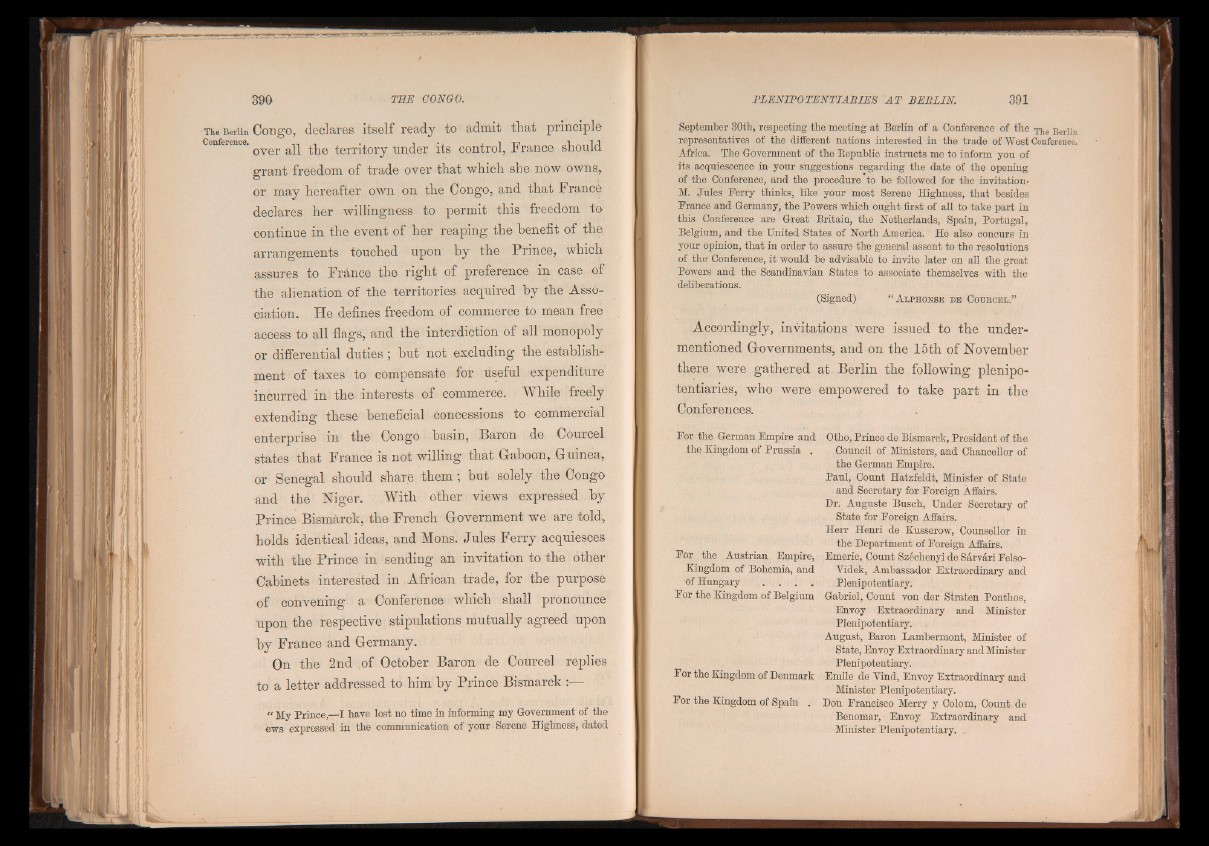
The Berlin Congo, declares itself ready to admit that principle
Confeience. » ap territory under its control, France should
grant freedom of trade over that which she now owns,
or may hereafter own on the Congo, and that Francè
declares her willingness to permit this freedom to
continue in the event of her reaping the benefit of the
arrangements touched upon by the Prince, which
assures to France the right of preference in case of
the alienation of the territories acquired by the Association.
He defines freedom of commerce to mean free
access to all flags, and the interdiction of all monopoly
or differential duties ; but not excluding the establishment
of taxes to compensate for useful expenditure
incurred in the interests of commerce. While freely
extending these beneficial concessions to commercial
enterprise in the Congo basin, Baron de Courcel
states that France is not willing that Gaboon, Guinea,
or Senegal should share them ; but solely the Congo
and the Niger. With other views expressed by
Prince Bismarck, the French Government we are told,
holds identical ideas, and Mons. Jules Ferry acquiesces
with the Prince in sending an invitation to the other
Cabinets interested in African trade, for the purpose
of convening a Conference which shall pronounce
upon the respective stipulations mutually agreed upon
by France and Germany.
On the 2nd .of October Baron de Courcel replies
to a letter addressed to him by Prince Bismarck :—
“ My Prince,—I have lost no time in informing my Government of the
ews expressed in the communication of your Serene Highness, dated
September 30th, respecting the meeting at Berlin of a Conference of the Tlle Ber]iE
representatives of the different nations interested in the trade of West Conference.
Africa. The Government of the Bepublic instructs me to inform you of
its acquiescence in your suggestions regarding the date of the opening
of the Conference, and the procedure to be followed for the invitation-
M. Jules Ferry thinks, like your most Serene Highness, that besides
France and Germany, the Powers which ought first of all to take part in
this Conference are Great Britain, the Netherlands, Spain, Portugal,
Belgium, and the United States of North America. He also concurs in
your opinion, that in order to assure the general assent to the resolutions
of the Conference, it would be advisable to invite later on all the great
Powers and the Scandinavian States to associate themselves with the
deliberations.
(Signed) “ Alphonse de Courcel.”
Accordingly, invitations were issued to the undermentioned
Governments, and on the 15th of November
there were gathered at Berlin the following plenipotentiaries,
who were empowered to take part in the
Conferences.
For the German Empire and Otho, Prince de Bismarck, President of the
the Kingdom of Prussia . Council of Ministers, and Chancellor of
the German Empire.
Paul, Count Hatzfeldt, Minister of State
and Secretary for Foreign Affairs.
Dr. Auguste Busch, Under Secretary of
State for Foreign Affairs.
Herr Henri de Kusserow, Counsellor in
the Department of Foreign Affairs.
For the Austrian Empire, Emeric, Count Szechenyi de Sarvari Felso-
Kingdom of Bohemia, and Videk, Ambassador Extraordinary and
of Hungary . . . . Plenipotentiary.
For the Kingdom of Belgium Gabriel, Count von der Straten Ponthos,
Envoy Extraordinary and Minister
Plenipotentiary.
August, Baron Lambermont, Minister of
State, Envoy Extraordinary and Minister
Plenipotentiary.
For the Kingdom of Denmark Emile de Vind, Envoy Extraordinary and
Minister Plenipotentiary.
For the Kingdom of Spain . Don Francisco Merry y Colom, Count de
Benomar, Envoy Extraordinary and
Minister Plenipotentiary. ,